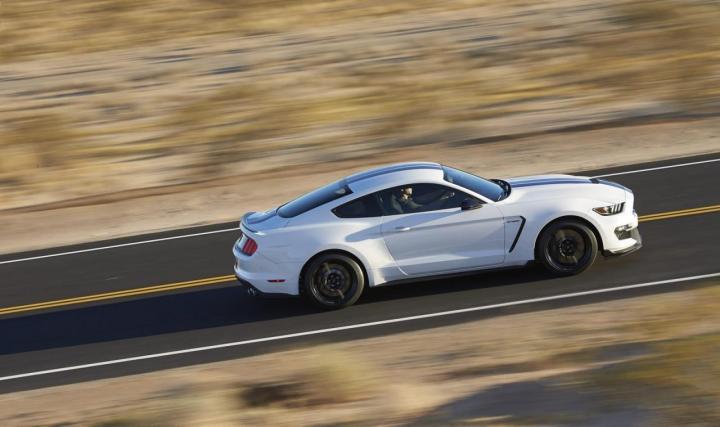
We now know that both the GT350 and the more hardcore GT350R will produce 526 hp and 429 pound-feet of torque. As Ford is quick to note, that’s 102 hp per liter of displacement.
The V8 also revs to a fairly high 8,250 rpm, which makes it the highest-revving production V8 in Ford history. Thankfully, Ford says 90 percent of the torque is available between 3,450 rpm and 7,000 rpm, ensuring drivers won’t have to rev the snot out of this engine just to get a response.
And while the power figures are certainly impressive, the engine’s design may be what makes it really memorable.
In an age where manufacturers rely heavily on turbocharging and supercharging for big power, Ford went the naturally-aspirated way with the GT350, with no form of forced induction.
The GT350 V8 is also a flat-plane crank design, something that’s only been seen on a handful of production engines. It gets its name from the attachment of the connecting rods to the crankshaft at 180-degree intervals, creating a “flat” profile.
Ford says this helps improve engine breathing, which in turn helps produce more power. It also gives the GT350 a distinctly different sound than traditional American V8 muscle cars, a sound that should make Camaro drivers tremble.
Speaking of the Camaro, it will be interesting to see how the GT350 stacks up against the new performance versions of its old rival.
The Mustang beats the outgoing naturally-aspirated Camaro Z/28 in horsepower, but not torque, and loses out to the supercharged Camaro ZL1 on both counts. Both of these models are slated to be replaced as the sixth-generation Camaro rolls out, though.
Of course, nothing from Ford or General Motors can touch the 707 hp of Dodge’s Challenger SRT Hellcat, but that never seemed to be Ford’s intention.
The GT350 is aiming to be more of an all-around sports car than a quarter-mile-eating muscle car. It will be the first Mustang offered with magnetic dampers, as well as other hardware meant to ensure it can handle corners as well as anything else.


